I’m trying to capture a system for books from end to end: picking a book all the way to a book notes post.
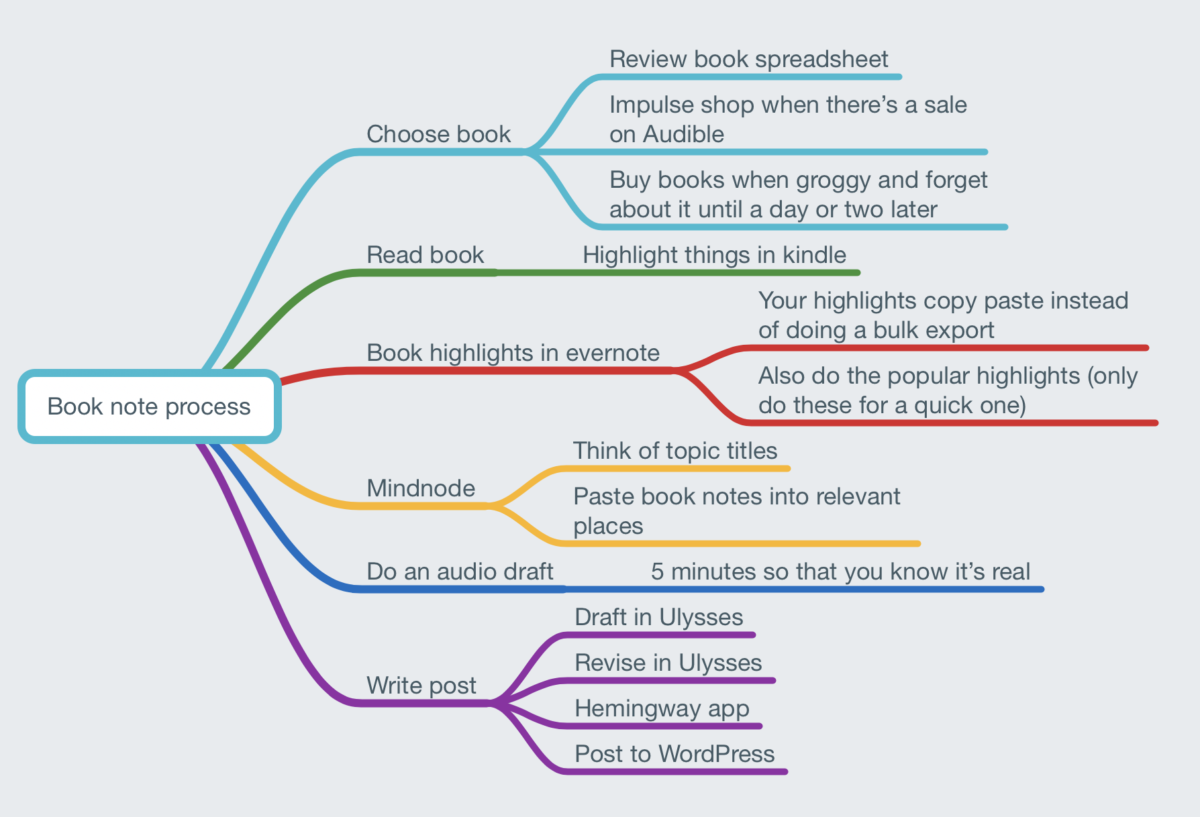
I’m writing at the gym. I wonder if there’s like a matte display cover for the iPad Pro 12.9″. I can see my reflection better than I can see my face. Okay I switched to the white theme and it’s much better. Here’s what I did this morning:
- Get coffee with Amy: It’s important to do things every day to build a relationship and this is my most important relationship.
- Walk to the gym: Walking first thing in the morning is good also for circadian rhythms and things like that.
- Audiobooks or voice recording while walking: This is the idea of pairing things. If I do something I enjoy (listening to an audio book or recording a voice note) while walking, then it makes walking more enjoyable.
I understand walking in itself can be enjoyable. If you’re mindful about it or even if not. But walking from place to place isn’t always the most fun activity. Pairing it with something fun seems like a good idea.
I’ve been using Just Press Record and Evernote as different tools for keeping an audio journal. I’ve also been recording directly into ScreenFlow when I’m at my desk to make private podcasts. I’ve been working on a system. I think I’m going to use Just Press Record when I’m out and about. I’ll use Evernote for organizing and tagging book notes and doing things where the output is eventually text. I’ll use ScreenFlow like I do already, for recording long-form audio. (Eventually I’m hoping this transition to like 2 minute videos. We’ll see)
- Morning workout: I’ve been following the 5-day split outlined in Bigger, Leaner, Stronger. Getting to the gym 5 days each week seems around where a goal should be. It’s attainable but also not easy.
A challenge I often have in the morning is deciding between writing, recording, or going to the gym. The first two always seem more fun. If health is a priority, I’d need a lot of justification to say the first two are better than going to the gym.
I’m going to work to make it as mindless as possible to get to the gym.
- Sauna meditation: The advantages here are two-fold. The sauna is relaxing. It’s another carrot for going to the gym. Likely a better one. It also gives me a place to meditate. Whether it’s an ideal meditation environment is up for debate. It has one big advantage: absolutely no digital distractions. Today I sat for 10 minutes.
- Writing: As mentioned at the top, I’m writing at the gym right now. Doing everything before this put me in the right mindset for writing. I’m also at a location with no distractions. I don’t know anyone here. The cafe area I’m sitting at is huge, comfortable, and I’m facing the water.
I don’t worry about “should I be doing something else instead” because I took care of other priorities already.
I should probably report back tonight to say how the rest of the day goes. It seems like starting off on the best foot possible. This was a great morning1. It’s up to me to make it a routine.
- I read The Miracle Morning a couple years ago. The acronym in the book is SAVERS, which was something like… let me look this up. I want to see how many of the letters I’m hitting without deliberately having that in mind. Okay it’s silence (check), affirmations, visualization, exercise (check), reading (check if audiobooks count), scribing (check).Which leaves affirmations and visualization. I’ll do affirmations as a voice recording on the way to work. I haven’t really tried visualization. I’ll read up more on it. ↩
I’ve stopped numbering these posts. One of the things I mentioned pretty often is that I don’t want to blog about blogging. Well the problem is that I do want to (like I’m doing right now). I just know it’s probably not the best use of time.
I’m going to try to write single posts around one topic again. One newsletter I look forward to every week is Eric Barker’s Barking up the Wrong Tree. Each week’s post is written around one topic. His latest is about 1500 words about positive self-talk.
I did some morning dictation. I put some book quotes in the left then talk through some thoughts on the right.
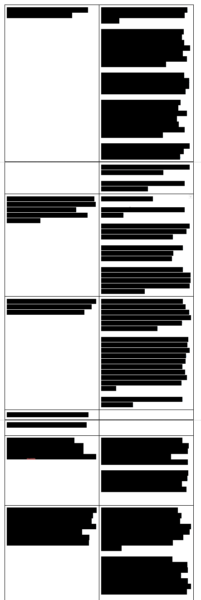
In the past I’ve used dictation and then generated pages and pages of text, just rambling. It becomes too much to want to wade through so I never end up using it. There’s probably something useful from speaking through things in the first place.
It might be good to give it some pre-structure before talking things through so that I can give myself swim lines for wading.
Here’s a quote from Bruce Lee in a book I’m reading about decluttering your mind:
“It’s not a daily increase, but a daily decrease. Hack away at the inessentials.” – Bruce Lee
With voice dictation, I’m able to generate a lot of text. It’s inessential text. So I need to figure out how to hack away at it. Give it some structure.
I’m starting to think more and more about what is essential in this blog. What makes me happy to work on it every morning? What doesn’t? What will others like?
I bought an iMac even though the macrumors buyer’s guide said don’t buy. It seems pretty clear that there will be some kind of update in the coming weeks but they probably aren’t form factor updates. Also the deal was 600 below the refurbished retail price so there’s definitely nothing that can match that unless they drastically cut the price.
In a previous post, I wrote about how The Alchemist aligns (or doesn’t) with some of my beliefs:
It’s essentially about following your dreams and the law of attraction. However you feel about those things just about sums up whether you’ll like the book or not. Meaning I’m somewhere in the middle. Passion isn’t the end-all for picking a career, but I think affirmations work.
We should be cautious weighing passion so heavily in picking a career. Derek Sivers’s says separating your job and your art is a good solution for being happy. I often reference the hypothetical person who loves surfing. He quickly realizes teaching 7AM classes to Wall Street guys on vacation isn’t quite as fun. In So Good They Can’t Ignore You, Cal Newport writes about a woman trading an advertising career to start a yoga practice for pregnant women and kids. It doesn’t go well.
Let’s say you have a business that is going well, you want it to grow as fast as possible right? Maybe not. The boy in The Alchemist helps a crystal merchant get more sales. The boy has a plan (sellTeaInCrystalShop-ver3.pptx) to accelerate that further.
“[…] If we serve tea in crystal, the shop is going to expand. And then I’ll have to change my way of life.”
“Well, isn’t that good?”
“I’m already used to the way things are. Before you came, I was thinking about how much time I had wasted in the same place, while my friends had moved on, and either went bankrupt or did better than they had before. It made me very depressed. Now, I can see that it hasn’t been too bad. The shop is exactly the size I always wanted it to be.
This reminds me of the Basecamp founders, David Heinemeier Hansson and Jason Fried. They write often about the perils of growth. (Here’s DHH’s latest: Exponential growth devours and corrupts.) (Check out some notes I wrote about DHH when he was on the Tim Ferriss show.)
More and more I see why “it depends” is always the answer. Becoming a millionaire is no use if you torch all your relationships to get there. Early retirement is no use if all your joy and motivation comes from work. Generally, I’d like this blog to be bigger, but I need to spend more time thinking about why.
A handful of strangers reading my stuff? Great! Oh, blogs can have hundreds or thousands of readers? Well, that handful seems a lot smaller now. The crystal merchant has always been happy with his sales look nice until he sees that they could be doubled or tripled:
Today, I understand something I didn’t see before: every blessing ignored becomes a curse. I don’t want anything else in life. But you are forcing me to look at wealth and at horizons I have never known. Now that I have seen them, and now that I see how immense my possibilities are, I’m going to feel worse than I did before you arrived. Because I know the things I should be able to accomplish, and I don’t want to do so.”
The first stand-up special I remember is Chris Rock’s Bring the Pain. I was at an age where I understood some jokes but missed the subtext. One joke I did understand was Chris Rock saying Bill Gates would jump out of a window if he woke up with Oprah’s money. Everything is relative.
In the past year I’ve tried practicing gratitude daily. Someone asked if being content is the same as being happy. (Or if being content is required to be happy.) You can break your brain thinking about that. You can be happy and strive for more. Though I imagine the happiest people never think about questions like this.
Oh yeah, the crystal merchant. He decides to sell tea with the boy, sales explode, and the merchant hires two more employees, and they begin importing a whole lot of tea. “You brought new feeling into my crystal shop.” he tells the boy.
Which sort of ckntraxics my points about growth being bad. Time for him to take that hockey stick chart to some VCs.
The Alchemist has a lot of other useful parables. In some ways it seems like there were some generic morals to share and the story is written around them to fit them in. That’s to say: a lot of crazy stuff happens in the book. Just like one thing after another and if nothing is happening then it’ll just skip month or even a year.
Follow your dream and you’ll find your treasure. Sometimes I believe that completely. Sometimes I wish I believed it more. Reading The Alchemist made me believe just a smidge more. That’s enough to make is worth reading.
I took a walk today around for probably a couple hours. A lot of it was getting more uniform. And then I went to Madison Square Park.
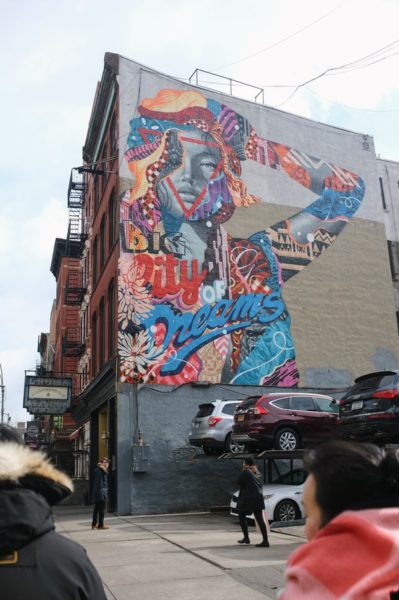

They talk about walking meditation
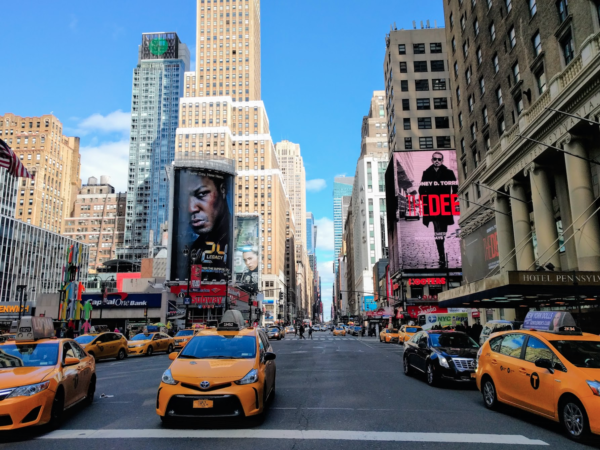



 Shout out to my old street corner for showing up in this Mind of a Chef episode about garbage. This is attached to a Key Foods. I walked by this literally every day.
Shout out to my old street corner for showing up in this Mind of a Chef episode about garbage. This is attached to a Key Foods. I walked by this literally every day.
Something I need to write about longer or add to my book notes post on Decisive is the 10-10-10 technique. When making a decision to do something or not, think in terms of 10-10-10.
- 10 minutes from now, how will I feel? Probably relieved that you took action on it at all.
- 10 months from now, how will I feel? In a lot of cases, it might not matter.
- 10 years from now, how will I feel? If it goes well, the benefits might outweigh the negatives if it doesn’t go well.
The example in the book is about asking a girl out on a date. It probably really depends on the situation, but it’s a good technique to have in the toolbox.
When writing directly in WordPress, my Chromebook really, really does the trick. I re-read my first impressions of the Chromebook and a lot of it still holds up. It’s great to take around. I even had a picture from using it while sitting on a bench at a park. Right now, there’s snow on the ground so those sure seem like really pleasant days.
The WordPress app for the iPad is the same as the iPhone app and designing for the iPhone clearly took priority. Using my MacBook for the WordPress console still tempts me to tinker with HTML/CSS. Or think about if I should be writing in Ulysses instead.
It’s just really pleasant writing on the Chromebook.
Looking back at old posts, I realized my favorite posts involved both writing and drawing. Lately I was only writing so last week I focused on drawing. That skewed a little too far the other way. I’m not good at writing, and I’m worse at drawing. So a post with just drawings certainly can’t stand on its own.
Combining okay writing with okay drawings is… well I don’t know if that’s exactly a winning combination either. Putting mediocre ingredients together gets you to like your local diner. Which, I mean, gets regular customers in and everyone seems friendly with each other and enjoys their time there.
Who would want that when you can be the Yelp diner with a cramped pseudo line out the door to get into the formal line to get the privilege of waiting for an hour to get in to most likely get some kind of omelette and some kind of waffles or French toast.
I started scheduling some posts. My Ulysses drafts was getting out of control. The app makes writing really pleasant so I end up writing in it a lot. My morning pages were going in there. Sometimes with morning pages, I add headings that I intend to move into their own posts eventually. Then, unsurprisingly, I never take the time to pull them out of the morning pages.
I needed to get back to my habit of finishing posts. Writing right in WordPress helps. Environments matter. Even digital environments. It’s why Seth Godin writes his daily post right in Typepad. I need to steal repurpose the idea and call it the Write Right Principle then write a $0.99 eBook about it.
I’ll try leveraging some other features in WordPress (scheduled posts) to focus on finishing posts. Right now I’ve got three book notes posts scheduled. They’re nowhere near where I’d like them to be for posting. (One is a hodgepodge of clips from the various morning pages I mentioned earlier.)
I’m hedging though. They’ll first get published to this micro section. It’s somewhat hidden in that none of the navigation goes here.
It’s an experiment, but it seems to be working already so I have a feeling it’ll be a long-term experiment.
I’m waiting for a haircut and I thought I’d try writing something in this micro section on the go.
I don’t know why I’m calling it a micro blog. That’s what Twitter is. This really is just a regular blog. The category should be like “casual” or something.
I’m still thinking about if I’m going to take pieces from here and revise them for a weekly post. That could be one way to go.
I’m almost done with Tokyo Vice. Really glad I read it. I was thinking that I like it because it’s written with each section as sort of a narrative. Or there are narrative elements at least. It’s based in reality though.
A running thread is how what actually happened differs from what he ended up seeing in the newspaper.
I read once that one of the best lessons you can have is to experience something that ends up being reported in a newspaper. Or to at least only be one degree removed from it. You can see how things get left out or described differently than what happened.
Then you step back and realize that happens for every article.
I’ve been thinking maybe I should just read a straight up crime novel. I wonder how big a difference it would be reading a nonfiction narrative with outrageous things happening to a fiction novel based in reality.
Oh yeah I also dipped into the next book I plan to read. I of course didn’t use the book list I said I would use. Up next was supposed to be The Alchemist.
Instead, I picked up Decisive. It’s by the same people who wrote Switch and Make it Stick. I remember when it originally came out, it just didn’t sound interesting to me. Making decisions wasn’t something I felt like I struggled with.
Now that I’ve been working on focusing, I’m finding that one of the things I struggle with is deciding what to focus on in the first place.
There are a few solutions to not knowing what to work on next. On one end is deciding quickly and having, say, a 25% chance that it’s the best thing to work on.
You can decide slowly and have a 80% chance that it’s the right thing to work on.
You can decide very very slowly to try to get to 100% but by the time you get started you could’ve done a couple 80% decisions.
Or something.
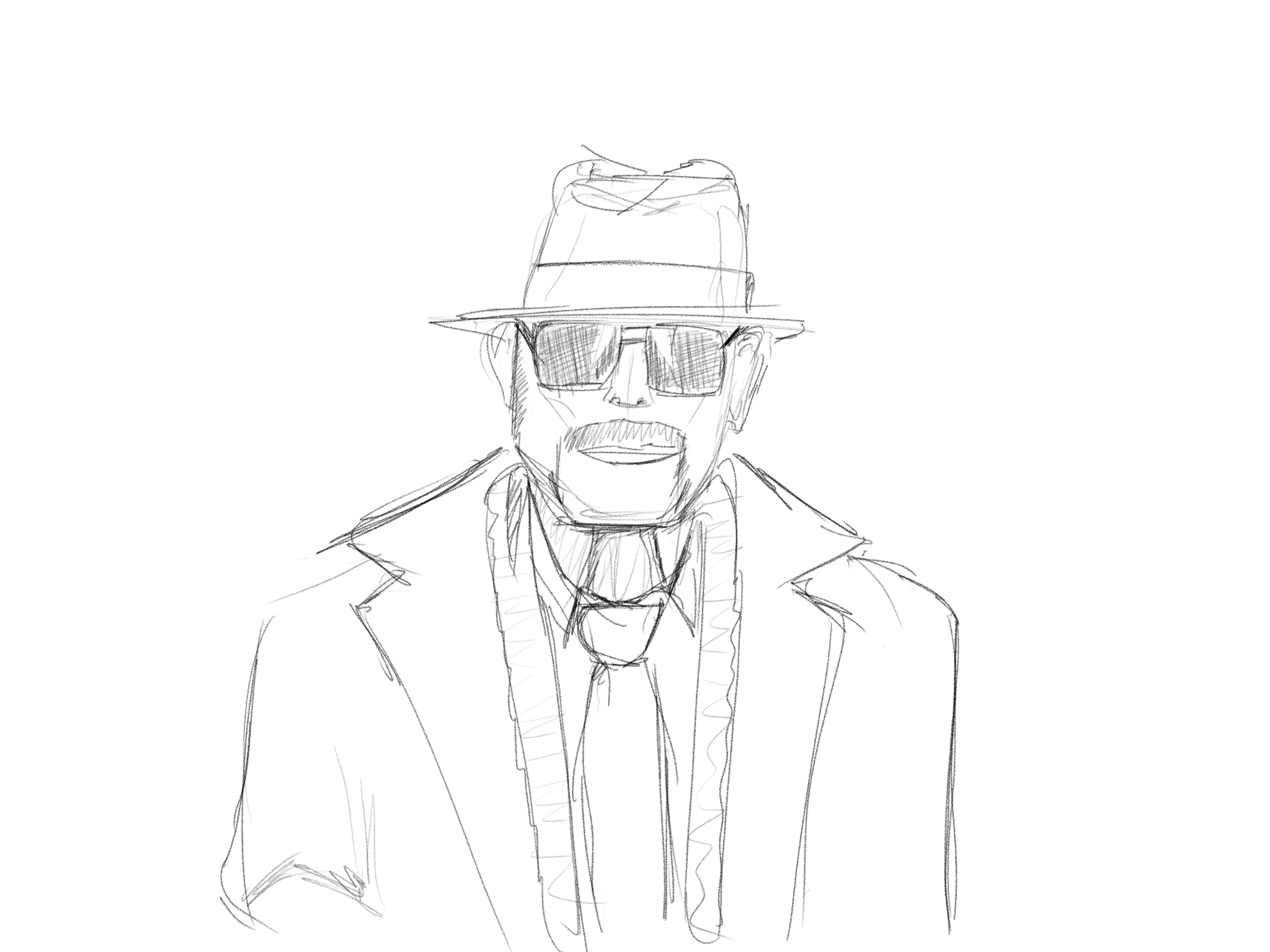
I paid money for a focus course. I’m realizing that I’m already okay at blocking off time. During that time, I’m even able to pay pretty good attention to whatever I’m working on. What I need to work on, though, is picking the right thing to focus on.
I also paid money for a top performer course. With design work, one of my strengths is learning how to use design tools. It’s a hard skill. (Hard as in the opposite of soft skills, not hard as in difficult.) Hard skills can be taught in a workshop and practiced. Hard skills are the ones that you can really do deliberate practice on.
However, soft skills separate the top performers.
“Someone once said that education was knowing what to do when you don’t know.” — One of Daniel Kahneman’s students
I’ve learned that experienced designers know what to do when they don’t know. I need to focus on learning how to do this. Sometimes I don’t know the answer. I won’t find the answer no matter how well I know to work with nested symbols in Sketch.
I’ve prided myself on being able to prototype. If you have enough knowledge to know the design won’t work in the first place, there’s no need to prototype it at all. This, of course, needs to be balanced. Less you become one of those pessimists that people build prototypes for to prove wrong.
Anyway, enough about thinking about this from a design perspective.
A more general soft skill that’s important is knowing what to focus on. If I break down what I’ve blogged about before, here’s what I’ve focused on.
- Writing and posting quickly: This, of course, is another reference to writing 100 posts in 100 days. It was a useful thing to focus on. I focused on finishing. Quality took a hit, though.
- Images and text, together: When bought my iPad a few months ago, I had a goal in mind to use images and text together to explain things I was learning or describe what I’ve been up to.
- Writing drafts: I bought Ulysses and started skewing things back to writing more and drawing less. I was doing a little more revising and focusing on book notes.
- Blogging about blogging: I’m doing this literally right now. It’s tempting because it doesn’t take as much thought as writing book notes. It might also be the least valuable thing to put effort into.
The posts I enjoy looking at were made when I was being deliberate about using images and text together. I’m going to spend February narrowing down on that. Yesterday and today, I drew for a good amount of time.
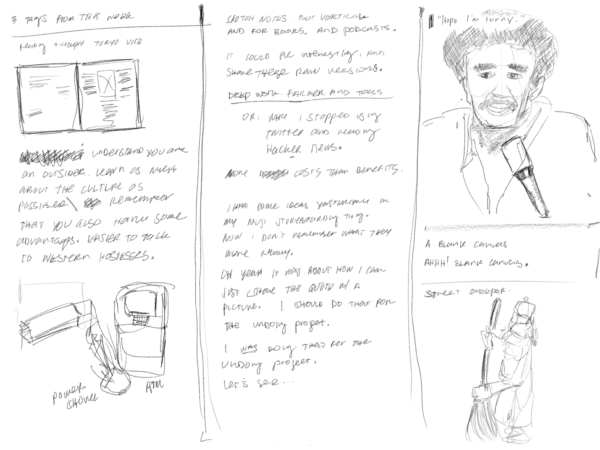
There’s some value in curation. Finding a good quote in the first place has some value. I don’t need to try and fail to write some brilliant thoughts to go with it. Instead I’ll lean toward matching that good quote with a mediocre sketch and hope it’ll turn into great quotes and good illustrations.
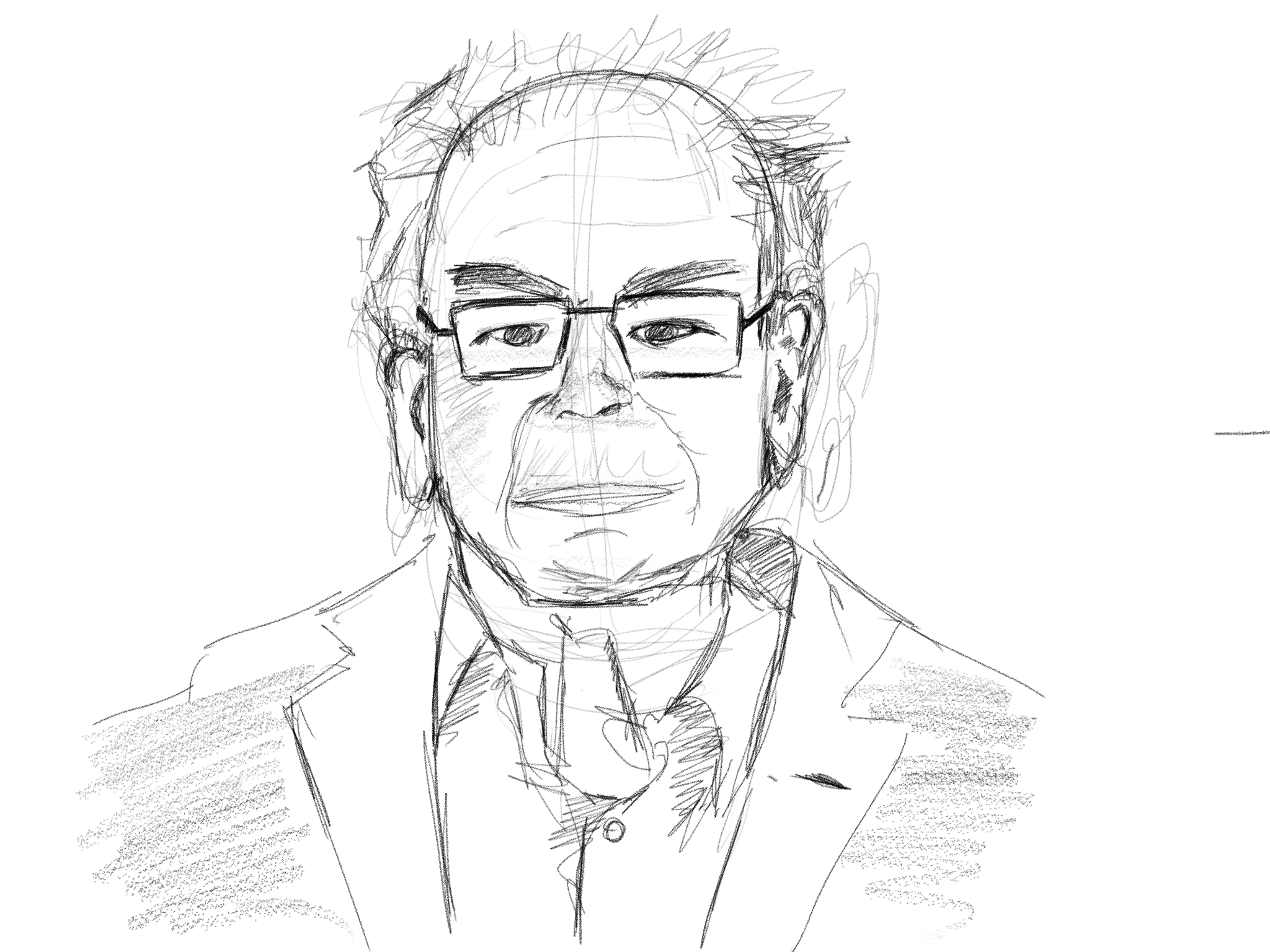
With practice, of course.
I was doing morning pages in Notability last week. Now I’ll try to review some and see how I can use them. I wrote a breakdown of 18 Minutes chapters.
It starts with a story to introduce a problem. The middle has details explaining how to fix things with some loose research to back it up. It ends with a callback to the story. Then it really ends with a small boxed summary that’s pretty close to what Derek Sivers calls a directive. No metaphor, just direct speak for what you should do.
There once was a guy who rambled and he got hit by a truck because he was rambling and he never got to the point.
Steven Pressfield tells interesting stories with lessons about creativity. 18 Minutes has somewhat less interesting stories with possibly more useful lessons. Either way, it’s a good format. It’s essentially a blog best-of in book form.
I am the rambler. The truck is a metaphor. It’s the ID4 dump truck and it’s driving my readers to better websites.
Directive: use directives to drive my writing.
I’m thinking I shouldn’t just re-type what I wrote in Notability.
Last year I made a doc with all my highlights from Cal Newport’s Deep Work. I copied and pasted them all from my Kindle Highlights page. Then I set a one minute interval timer to go through each of them and write thoughts for a minute each.
After doing that exercise, I thought it’d be good to do that more often for every book I read.
A year later, I wish I followed through on that because the highlights are good to read through.
I wrote about de-cluttering and also shared some tips that stuck with me through reading a few tidying books. One of them was to learn to be okay getting rid of sentimental things.
I finally tossed a bunch of work notebooks. Some were from last year around the time I originally read Deep Work. I flipped through them and almost kept a couple because there were some good examples of scheduling blocks of time for deep work. Out with the old, though.
Still, I can’t toss one journal of mine. I wrote in it from probably 2004-2008. I didn’t fill it. It captured some of my thinking from college. I also had enough awareness at the time to comment on how dumb some of it would seem in the future.
It’s still easy to get caught up in, though, no matter how aware you are. Though that’s probably the first step.
Some of the things that stuck with me from Deep Work: practicing being bored, making the internet less of a source of entertainment, and working on single problems for longer blocks of time.
My problem now is picking the right thing to work on. Cal has mentioned The One Thing and Essentialism as good books for narrowing this down.
I thought it’d be good to capture some of my early thoughts on Jake Adelstein’s Tokyo Vice. It’s about an American reporter working for one of Japan’s national newspapers. I read a sample chapter sometime last year and enjoyed it but didn’t buy the full version until now.
I read 18 Minutes last week. I got away from my books spreadsheet and that was a little bit of a guilty pleasure. Productivity books are probably the lamest possible guilty pleasure. The story-per-chapter format works well for Steven Pressfield’s trilogy on creativity. It also works well for Peter Bregman’s 18 Minutes.
I enjoyed it but it reminded me of why I wanted to get away from reading these kinds of nonfiction books. It had a chapter on the marshmallow study. A mention of the study where you’re more likely to follow through if you set a date and time. Growth mindset? Check. 10,000 hours? Check.
In the middle of reading 18 Minutes I realized that nearly everything made me think of work. Which isn’t exactly the best thing for casual reading outside of work.
I’ve been a little focused on the takeaways from a book. What will I remember a year from now? I need to reconsider that reading for leisure means enjoying the book during leisure time. I don’t go to dinner with friends thinking about what takeaways will stick a year from now. I go because it’s enjoyable in the present and probably the best possible use of my time that can take place with any regularity.
Reading can be a getaway. That’s why I’m really happy so far with Tokyo Vice. It’s so far removed from the productivity and creativity books that I filled last year with. Not only is it a different country, it’s a different time. The culture is so different and Adelstein captures his perspective so well. You get a sense of what being an outsider in Japan is like.
I’m going to try continuing with my rule: if there’s no narrative, I’ll listen to the audiobook.
My early directive for Tokyo Vice: learn as much as you can about the culture you’re trying to be a part of while understanding that you’re still an outsider. There are also some advantages to being an outsider so figure out how to use those.
This micro blog will pretty much be a blog about what I’m currently reading.
I wrote a post for Sick in the Head and still want to write more about how the top performers have similarity to the guests in Tools of Titans. In a 1984 interview with Garry Shandoing, Judd says this.
Judd: This is the comedy interview program that talks serious about comedy.
This describes the book well. I read a few books about comedy last year. One thing was clear: making funny things takes serious work. Also, it’s a craft like others. There are people who grew up in the exact situation where things look like natural talent. For the rest of us, comedy can be learned.
All the great stand-up comedians did a ton of stand-up. All the great writers did a ton of writing. Some did both.
It’s cool to see different perspectives. Some people think it’s good to turn over your entire act. Others are fine doing old bits knowing most of the audience hasn’t heard it.
I have a lot of book highlights. I highlight too much. I have a backlog of books that I finished reading in December and January that I want to write book notes for but have procrastinated on. Part of this micro blog goes along with the idea of taking the least action on something. If I can just post a highlight with rough thoughts on it, it’ll help build momentum to writing the full book notes post.
Here’s one from Momo.
True, they earned more money and could also spend more. But they had morose, exhausted, and even bitter faces with unfriendly eyes.
It’s a children’s book from the 70s but it resonates so well today with all the focus on productivity and work efficiency. People succeed at saving time in some task only to fill that new free time with some other task.
This reminds me, I need to write something about Cal Newport’s Deep Work. It’s been a year since I read it so it’d be a good time to review it because I probably changed my approach to things more based on that book than any other last year.
